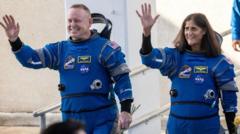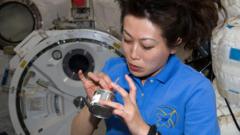Group Captain Shukla will conduct scientific experiments and gain experience for India's future space exploration goals.
**Shubhanshu Shukla: First Indian Astronaut to Arrive at ISS**

**Shubhanshu Shukla: First Indian Astronaut to Arrive at ISS**
Indian astronaut Shubhanshu Shukla embarks on historic journey aboard Axiom-4 mission.
Astronaut Shubhanshu Shukla is poised to make history as the first Indian to arrive at the International Space Station (ISS) during the Axiom-4 (Ax-4) mission. On Wednesday, Group Captain Shukla launched with his multinational crew, which includes former NASA veteran Peggy Whitson, Poland's Slawosz Uznanski-Wisniewski, and Hungary's Tibor Kapu. Videos from Axiom Space showed the crew joyfully floating in their spacecraft shortly after launch.
Group Captain Shukla’s journey marks a significant milestone, as he is only the second Indian to venture into space, following Rakesh Sharma, who flew aboard a Russian Soyuz in 1984. The Ax-4 mission lifted off from NASA’s Kennedy Space Center in Florida at 2:31 am EDT (12:01 pm India time) and is expected to dock with the ISS on Thursday at 7:00 am EDT (4:30 pm India time). This commercial flight, operated by Houston-based Axiom Space, is a collaborative effort involving NASA, India's ISRO, the European Space Agency, and SpaceX.
During their two-week mission, Shukla and his colleagues will conduct 60 scientific experiments, including seven projects developed by ISRO. The organization has invested 5 billion rupees ($59 million) to secure Shukla’s seat on the Ax-4 and ensure proper training, aiming to further India’s ambitions in human spaceflight. ISRO has plans to launch its first human space mission in 2027 and to establish a space station by 2035, with aspirations to send an astronaut to the Moon by 2040.
Shortly after their launch, Shukla participated in a live uplink with Axiom Space, sharing his initial experiences in space. “What a ride!” he exclaimed, expressing enthusiasm about the sensation of floating and adapting to life in zero gravity. The astronauts were also accompanied by a small white toy swan named Joy, introduced as the mission's "zero-G indicator," which Shukla noted symbolizes wisdom amid distractions.
Commander Peggy Whitson shared the name of their spacecraft, Grace, representing more than mere technical achievement. It reflects the elegance of space travel and underscores the spirit of human endeavor for the benefit of all. As this historic mission unfolds, astronaut Shubhanshu Shukla, alongside his diverse crew, embodies a new era of exploration and collaboration in space.

















